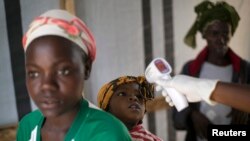Sierra Leone may be declared Ebola-free in early November, but caring for the country's 4,051 Ebola survivors remains a big challenge. Many survivors report joint pain and vision problems, and experts also are worried about the risk of relapse.
Typical of the survivors is Fatmata Conteh, who lives in the village of Rokupa, an eastern part of Freetown. Since she survived Ebola, she has been experiencing joint pain that has made it impossible for her to work. As a result, she said, she doesn't have enough money to pay her rent, which has added to her stress.
But there is some help available. Conteh has been getting free medical treatment at a clinic for Ebola survivors, run by Doctors Without Borders, also known by its French acronym, MSF.
The MSF field coordinator for the Ebola survivors program, Patrick Trye, said Ebola survivors' health complications have become a major concern. The country's health system was not strong before Ebola, and he worries about how it will manage now. The system lacks human resources, and specialists in particular, he said.
In all, there are about 17,000 Ebola survivors in West Africa, and concern is rising over how long they can harbor the virus in their systems.
A Scottish nurse, Pauline Cafferty, who contracted the virus in Sierra Leone last year, had an apparent relapse this month. According to a BBC report, the virus was lingering in her brain and caused her to become ill with meningitis.
A recent study found the virus can stay in semen for up to nine months. It also is known to stay in eye fluids after recovery, and that worries Dr. Matthew Vandy, an ophthalmologist.
“The simple fact that the persistence of the Ebola virus is in the eye, it is a big challenge," he said. "Cataracts is major cause of blindness [in Sierra Leone] and the only treatment is surgery, so if somebody has a live [Ebola] virus and you go and operate on that person, there is a danger that you are dealing with the virus, touching the virus.”
Vandy is pushing for a study to be done in Sierra Leone on how long the virus can stay in a survivor’s eye.
Conteh has concerns, too. She said she was worried because not enough is known about the disease and there's still much to study.
For now, she is just hoping her treatments will help her health complications improve.




